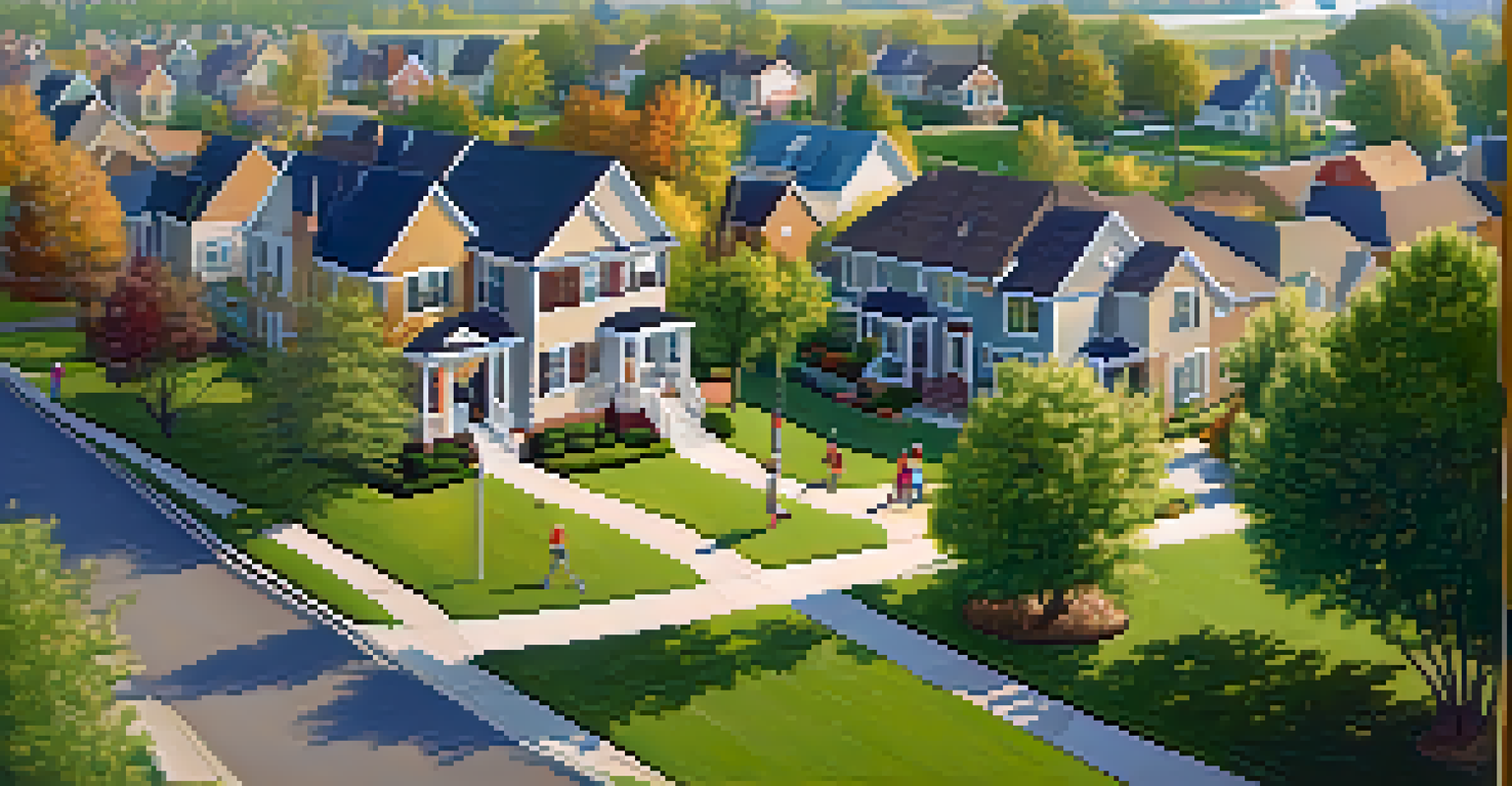Impact of GDP Growth on Real Estate Market Dynamics

Defining GDP and Its Significance in the Economy
Gross Domestic Product (GDP) is a vital economic indicator that measures a country's total economic output. It reflects the health of an economy by showing how much value is added through various sectors like services, manufacturing, and agriculture. Understanding GDP is crucial, as it influences government policy, investment decisions, and consumer confidence, all of which directly affect the real estate market.
The economy is a very complicated issue, but we have to make it simple enough to understand.
When GDP grows, it typically indicates that businesses are thriving, jobs are being created, and consumers have more disposable income. This positive economic environment can lead to increased demand for housing, both for purchase and rental. As people feel confident in their financial stability, they're more likely to invest in real estate, driving prices up and energizing the market.
Conversely, a stagnant or declining GDP can signal economic troubles, leading to decreased real estate activity. In such situations, potential buyers may hesitate to make significant investments, fearing job loss or financial instability. Therefore, understanding the relationship between GDP and real estate is essential for investors and homeowners alike.
How GDP Growth Affects Housing Demand
As GDP rises, so does consumer confidence, which often translates into increased housing demand. When people feel secure in their jobs and income, they are more likely to enter the housing market. This demand surge can lead to bidding wars, particularly in desirable locations, pushing property prices higher.

In addition, strong GDP growth can lead to population growth as people move to areas with more job opportunities. This influx creates further demand for housing, resulting in a competitive market where buyers may need to act quickly to secure a home. The increased competition often benefits sellers, who can command higher prices.
GDP Growth Fuels Housing Demand
As GDP rises, consumer confidence increases, leading to greater demand for housing and driving property prices up.
Moreover, economic growth can lead to the development of new infrastructure, such as schools, parks, and public transport, making certain neighborhoods more attractive. This combination of higher demand and enhanced living conditions can significantly impact property values and contribute to a thriving real estate market.
The Role of Interest Rates in Real Estate Dynamics
Interest rates are closely tied to GDP growth and play a crucial role in real estate dynamics. When GDP is growing, central banks may raise interest rates to prevent the economy from overheating. Higher interest rates can lead to increased mortgage costs, which may deter some buyers from entering the market.
Real estate is the best investment on earth, however, when the earth is not growing, real estate is not growing.
For example, if interest rates rise significantly, potential homebuyers might find that their monthly payments become unaffordable. This could lead to a slowdown in housing demand, causing prices to stabilize or even decline. Understanding this interplay between GDP growth and interest rates is vital for anyone looking to invest in real estate.
On the flip side, when GDP growth is slow, central banks may lower interest rates to stimulate economic activity. Lower rates can encourage borrowing, making it cheaper for buyers to finance their homes. This dynamic can reignite interest in the real estate market, leading to increased sales and potentially higher prices.
Investment Trends During Economic Growth
During periods of GDP growth, the real estate market often sees a surge in investment activity. Investors tend to feel more optimistic about future returns, prompting them to purchase residential and commercial properties. This influx of investment can drive up property prices and enhance development opportunities.
Additionally, as economic growth leads to increased disposable income, more individuals may consider real estate as a viable investment option. They may enter the market looking for rental properties or vacation homes, further stimulating demand. This trend can create a ripple effect, encouraging more development projects to meet the heightened demand.
Interest Rates Impact Real Estate
Higher interest rates during GDP growth can deter buyers, while lower rates in slow growth periods can stimulate the housing market.
Moreover, robust economic growth can attract institutional investors, such as real estate investment trusts (REITs) and private equity firms. Their participation in the market can lead to larger-scale developments and increased competition, ultimately shaping the real estate landscape.
Geographical Variations in Real Estate Response
The impact of GDP growth on real estate can vary significantly by region. Urban areas, particularly those with robust job markets and amenities, often see more pronounced effects. In contrast, rural areas may experience slower growth in their real estate markets, even during periods of overall economic expansion.
For instance, cities like San Francisco or New York tend to attract more buyers due to their strong economies and job opportunities. As GDP grows, these markets can see rapid price appreciation, while less populated regions may struggle to keep up. Buyers in these urban settings are often willing to pay a premium for proximity to work and lifestyle amenities.
However, some rural areas may also benefit from GDP growth if they offer affordable housing options or are located near growing metropolitan regions. This can lead to increased interest from buyers looking for more space or a lower cost of living. Understanding local market dynamics is crucial for anyone considering real estate investments.
Challenges and Risks During Economic Expansion
While GDP growth can create opportunities in the real estate market, it also brings challenges and risks. Rapid price increases can lead to affordability issues, making it difficult for first-time buyers to enter the market. This situation can create an imbalance, where only affluent buyers can afford properties, potentially leading to a housing bubble.
Moreover, as demand outstrips supply, developers may rush to build new homes or commercial properties. If this growth occurs too quickly, it can result in oversupply, leading to a market correction. Investors should be cautious of overextending themselves during periods of rapid growth, as the market can shift unexpectedly.
Investment Trends in Economic Growth
During GDP growth, real estate investments surge as optimism about future returns increases, impacting property prices and development.
Additionally, economic expansions can lead to rising construction costs due to increased demand for materials and labor. This can affect the profitability of new projects and may prompt developers to delay or scale back their plans, impacting the overall market dynamics.
The Future Outlook: Sustaining Growth in Real Estate
As we look to the future, sustaining GDP growth will be vital for maintaining a healthy real estate market. Policymakers must focus on creating a stable economic environment that encourages investment and job creation. This stability will help ensure that the housing market remains robust, with opportunities for both buyers and investors.
Moreover, as technology continues to evolve, the real estate industry must adapt to new trends, such as remote work and smart home innovations. These changes can influence where people choose to live, potentially shifting demand to suburban areas or even smaller cities. Understanding these trends will be crucial for stakeholders in the real estate market.

Ultimately, the interplay between GDP growth and real estate dynamics will remain a critical area of focus for investors, developers, and homeowners. By staying informed about economic indicators and market trends, all parties can navigate the complexities of the real estate landscape effectively.